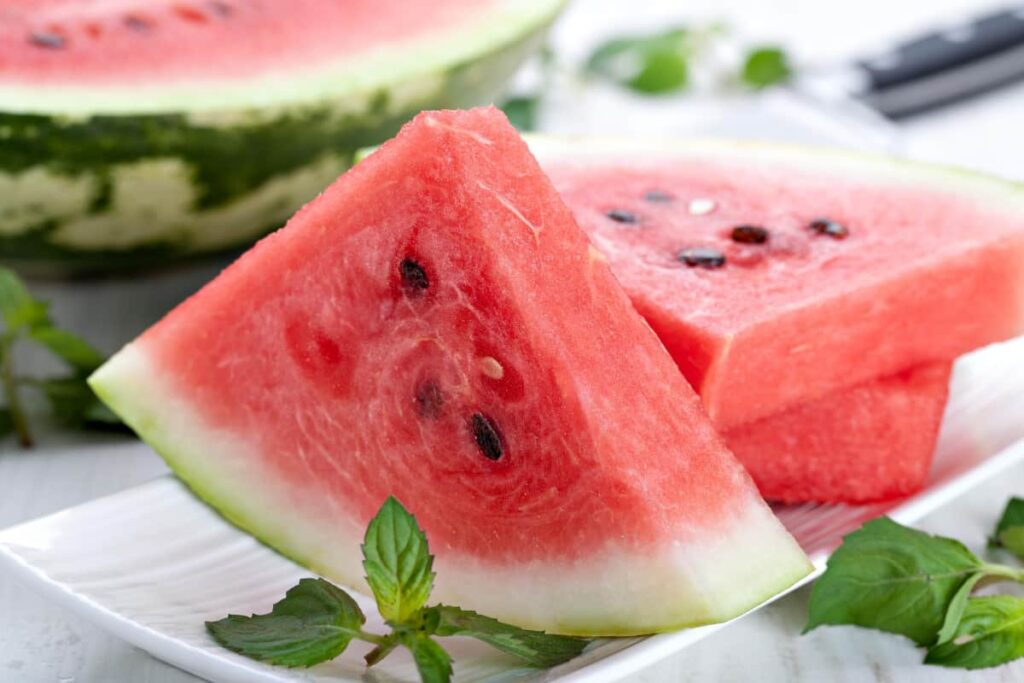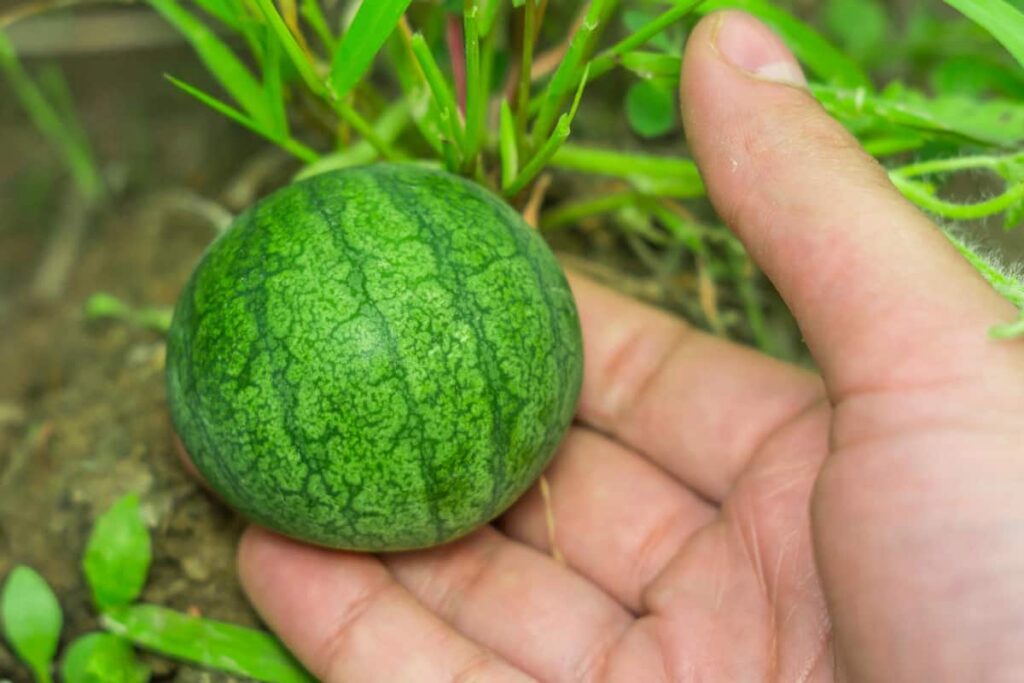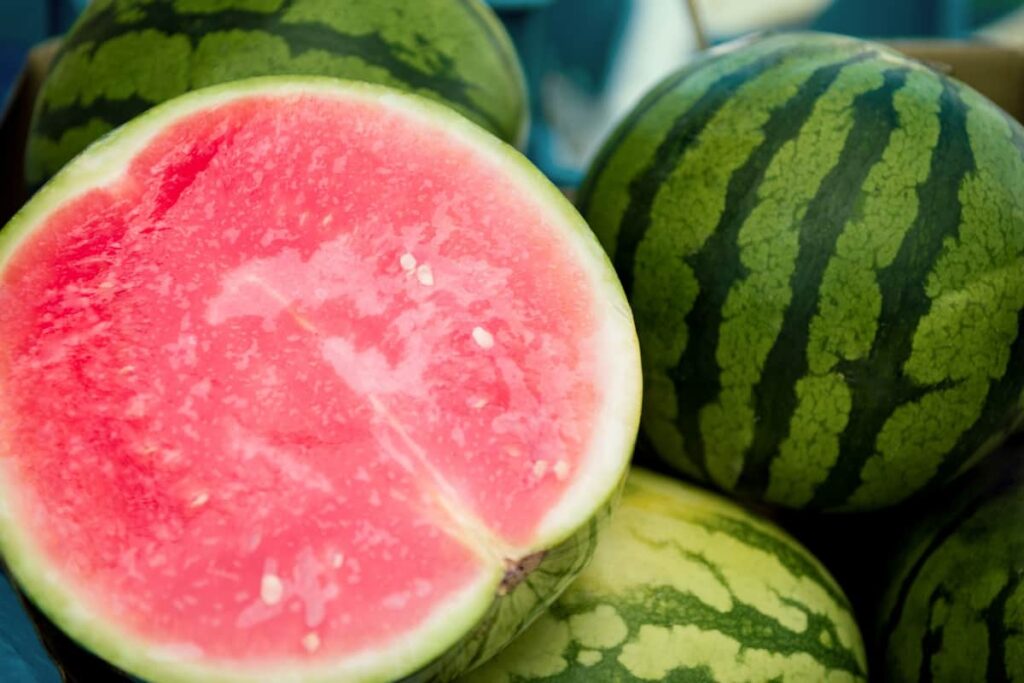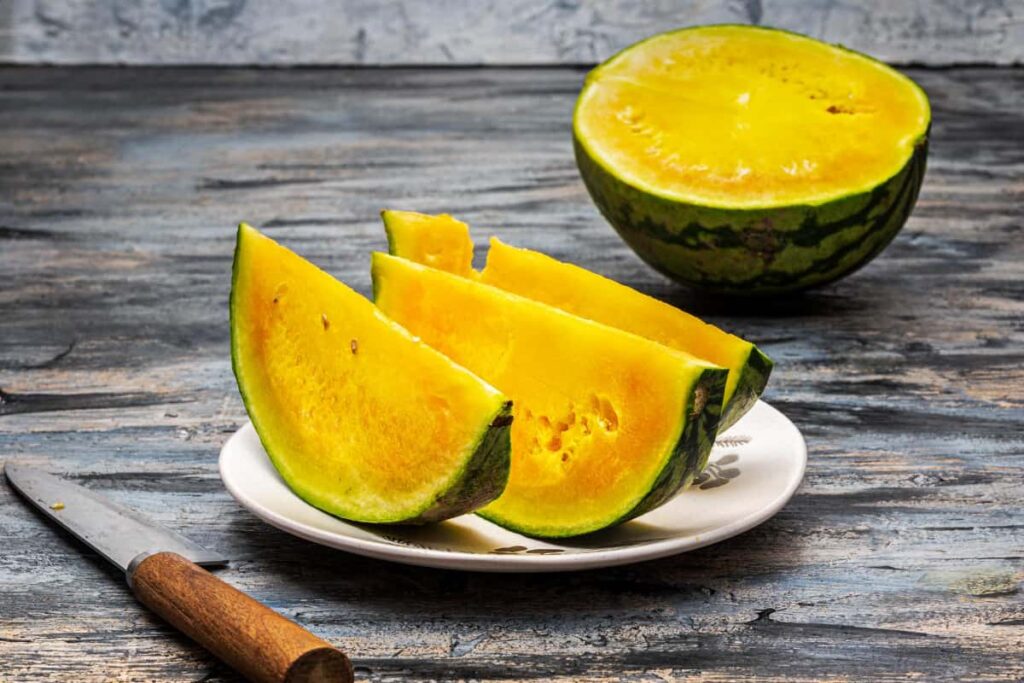Watermelon is just about everyone’s favorite fruit in the summer. On hot days, a fruit made up of over 90% water is a preferred choice for those in search of refreshment.
Whether in a cocktail, a fruit salad, or a sweet, this delicious fruit is also referred to as a vegetable. So, is watermelon a fruit or a vegetable?
In this article, discover how the watermelon is classified.
- Related article: Vegetable and Fruit Overview

Is Watermelon a Fruit or Vegetable?
Watermelon is actually both a fruit and a vegetable at the same time. By its botanical defnition, watermelon is a fruit. By its culinary definition and by Oklahoma, watermelon is a vegetable.
Watermelon is a fruit, at least officially. Botanically, it as a fruit. But if you travel to Oklahoma, the folks there will tell you it’s a vegetable. In 2007, Oklahoma declared watermelon, the state’s official vegetable. Could it be a “fregetable”?
Scientifically, the watermelon is named the Citrullus lanatus. It is a very versatile and healthy plant part when consumed. Depending on your perspective, watermelon can be considered a fruit or a vegetable.
Let’s look at how the watermelon is considered a fruit and vegetable.
Watermelon is a Fruit
Botanists officially classify the watermelon as a fruit. This is because this fruit develops after the plant flowers, from the plant’s ovary. It also contains seeds necessary for reproduction.
Watermelon is a vining plant that is cultivated for its fruit. These plants produce yellow flowers with five petals, each a different length. Male flowers will feature pronounced reproductive organs. Female flowers have less visible organs but can produce fruit if pollinated.
Fruits are usually employed for sweet dishes. Watermelon is sweet-tasting, so many consider watermelon a fruit due to the taste too.
Watermelon is a berry and specifically, a pepo fruit in science terms. Pepo fruits feature a hard rind. It is in the same group as cucumbers, pumpkins, squash, and cantaloupes.
Watermelon is a Vegetable
Vegetables are anything from edible parts of plants. In the broader sense, fruits are also vegetables. But not all vegetables can be classified as fruits.
The state of Oklahoma embraces the broader definition. Within the state’s borders, the watermelon is officially a vegetable. How does an Oklahoman view everyone’s favorite summer fruit as a vegetable?
The watermelon is a member of the Cucurbitaceae family together with the cucumber and gourds. They are cultivated using the same production processes as vegetables.
Despite being sweet tasting, they are also treated like vegetables for culinary purposes. An entire watermelon can be eaten. Rinds are eaten stewed, pickled, or prepared in stir-fries. In Asia, watermelon rind is eaten as a vegetable.
So, watermelon does fall into the vegetable category for many.

What Are Some Watermelon Varieties?
Watermelons are classified into four main categories. Each category has its own many varieties.
1. Icebox Watermelon
The icebox watermelon variety is cultivated to feed a small family or single person. They are smaller, weighing 5 to 15 lbs, so that it can fix in an icebox. Most of the icebox varieties will mature in 75 days.
Varieties include:
- Sugar Babies that have sweet pulp protected by a dark green rind.
- Tiger Babies that appear golden when mature.
2. Picnic Watermelon
Picnic watermelons are a larger variety that weigh about 16 to 45 pounds. They tend to be large and oblong or round. They are sweet and mature in approximately 85 days.
Varieties include:
- Allsweet These melons weigh 25 to 35 lbs. Its bright red flesh is juicy and sweet.
- Black Diamond is a melon that can weigh over 50lbs. They require a long growing season.
- Charleston Gray These melons were developed in 1954 by the USDA as a disease resistant variety.
- Crimson Sweet is a variety developed in 1963 by the University of Kansas. These oval fruits have deep red flesh.
- Jubilee These are slow growing melons that are disease resistant
3. Seedless Watermelon
The seedless watermelon varieties were created in the 1990s for those that hate spitting seeds. Seedless watermelons have underdeveloped tiny seeds. They weigh from 10 to 20 pounds and need around 85 days to mature.
Varieties include:
- Millionaire is a seedless hybrid variety that weighs from 15 to 22 lbs. It requires 90 days to mature.
- King of Hearts is a melon weighing 14 to 18 lbs. and has a thick rind.

4. Yellow and Orange Fleshed Watermelon
Yellow and orange fleshed watermelon varieties are generally round, and can be seedless or seeded. They have yellow or orange flesh, a stark contrast from bright red flesh.
Varieties include:
- Desert King is a drought variety of watermelon that is sun scald resistant.
- Yellow Doll is a lightweight early maturing melon. The flesh is yellow and sweet.
- Tendergold is a medium-sized melon with sweet golden flesh.

Watermelon Health Benefits
When it comes to nutrients, the watermelon is a superstar. It contains impressive amounts of vitamins A, B6, and potassium. It also boasts anti-inflammatory capabilities. It also features high levels of lycopene. Lycopene is believed to offer major antioxidant benefits.
Here are some of the main benefits from a watermelon:
1. Watermelon Keeps You Hydrated
Hydration aids in temperature regulation, organ function, and the delivery of nutrients to cells. Watermelon is made of 92% water and offers a way for daily water intake. With a high water content, it also has a low-calorie content aiding in weight management, too.
2. Watermelon Combats Cancer
Watermelon has plant compounds that battle certain forms of cancer. Research associates lycopene intake with lowering cancer risks, including colorectal, prostate, and colon cancer.
3. Watermelon Improves Cardiovascular Health
Heart disease and high blood pressure are killers. Lifestyle choices can lower both blood pressure and cholesterol, which then lowers disease risks.
Research indicates that lycopene also helps to lower cholesterol. The amino acid, Citrulline, in watermelon also can lower blood pressure. It also resists oxidative harm from high cholesterol.
4. Watermelon Benefits Eye Health
Watermelon component lycopene also benefits your eyes. Macular degeneration which can cause blindness is linked to aging. Research suggests lycopene may prevent and limit macular degeneration progression and damage.
5. Watermelon Improves Skin Health
Watermelon contains vitamins A and C, which are both important to skin health. Vitamin C ingested or applied topically helps the body manufacture collagen. Vitamin A creates and repairs skin cells.
Is Watermelon a Fruit or Vegetable? Final Thoughts
Watermelon is both a fruit and vegetable, and an excellent source of nutrition. It’s a great snack option as well as a healthy addition to any meal.
You may also be interested in these other articles:

